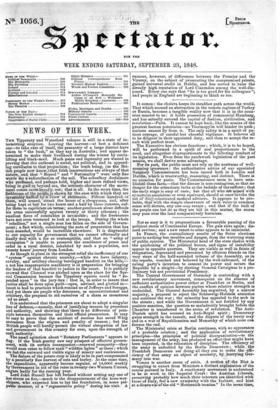NEWS OF THE WEEK.
THE Tipperary and Waterford volcano is still in a state of in- termitting eruption. Leaving the harvest—at best a deficient one—to take care of itself, the peasantry of a large district have taken to " the bush," as they say in Australia ; and appear de- termined to make their livelihood during the winter by cattle- lifting and black-mail. Much pains and ingenuity are wasted in proving that this outbreak is social, not political, and in append- ing corollaries to that proposition ; the truth being, (as the Bri- tish people now know,) that Irish insurrections are always of that nature, and that " Repeal" and " Nationality" were only fine words for a redistribution of the soil. The schoolboy declaimers who professed, and perhaps held, higher and more refined views, being in gaol or beyond sea, the intrinsic character of the move- ment comes more broadly out; that is all. In the mean time, the feebleness of the pe.otkis shown by the ease with which they are invariably baffled by a 1;..iow of resistance. Fifteen hundred of them, well armed, attack the house of a clergyman, and, after being kept at bay for two hours and a half by three inmates, suf- fer them to capitulate on terms; another gentleman alone defends his arms successfully against twenty or thirty pikemen ; the smallest force of constables is invincible ; and the freebooters have not even ventured to look at the troops. During the whole " rebellion," not a single man has fallen on the side of Govern- ment; a fact which, considering the note of preparation that has been sounded, would be incredible elsewhere. It is disgraceful to our capacity for government that we cannot effectually and finally deal with a foe so contemptible, and that an " army of occupation" is unable to preserve the semblance of peace and order in a rural district, inhabited by such a population, not twenty hours' journey from London. As though to place in the strongest relief the inefficiency of our " system against chronic anarchy,—while we have infantry, cavalry, and artillery chasing barelegged banditti on the hills,— a not less inappropriate machinery is in preparation for bringing the leaders of that banditti to justice in the court. It is publicly avowed that Clonnlel was pitched upon as the place for the Spe- cial Commission because the Tipperary squires could be " de- pended upon" in the jury-box : that is, in order to insure that justice shall be done upon guilt—open, advised, and gloried in— resort is had to practices which remind us of Jeffreys and Scroggs. And yet there are people who denounce, as unconstitutional and arbitrary, the proposal to rid ourselves of a sham so monstrous nd so cruel.
It is understood that the prisoners are about to adopt a singular line of defence,—namely, that of justifying treason by precedent and authority, and showing that there is no difference of prin- ciple between themselves and their official prosecutors. It may be easy to prove that the accident of success has saved Whig statesmen from the stigma and penalty of treason ; but the British people will hardly permit the virtual abrogation of law and government in this country for ever, upon the strength of such authority. The small agitation about "Rotatory Parliaments" appears to flag. If the Irish gentry saw any prospect of effective govern- ment, with its certain consequence—renewed prosperity—they would soon cease to follow such" wildfire lights ' as these ; which are but the outward and visible signs of misery and restlessness. The failure of the potato crop is likely to be in part compensated by a peculiarly fine harvest of oats and barley. At the same time, the expenditure, apparently become regular, of 14,0001. weekly by Government in aid of the rates in twenty-two Western Unions, augurs badly for the ensuing year. Lord John Russell has left Ireland without setting any one of her rivers on fire,—much to the disappointment of the hero-wor- shipers, who expected him to lay the foundation, in some pal- pable manner, of a "regenerative policy" during his visit. A rumour, however, of differences between the Premier and the Viceroy, on the subject of prosecuting the compromised priests, gained universal credit in Dublin, and has served to :raise the already high reputation of Lord Clarendon among the well-dis- posed. Every one says that "he is too good for his colleagues"; and people in England are beginning to think so too.


























